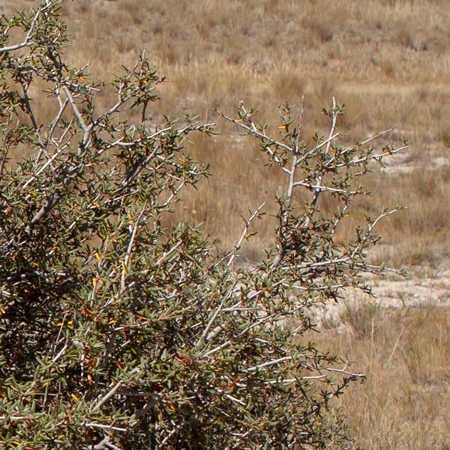On the Missouri River above present Fort Peck Dam, a wounded grizzly bear chases Pvt. Bratton, and collapsing river banks threaten the boats. Lewis describes two sages: greasewood and black sagebrush.
Bratton Shoots a Grizzly Bear
by Yellowstone Public Radio[1]Originally aired weekdays by Yellowstone Public Radio during the Bicentennial observance of 2003-2006. Narrated by Hal Hansen. Scripts by Whit Hansen and Ed Jacobson. Produced by Leni Holliman. © … Continue reading
Greasewood
Sarcobatus vermiculatus
Three Forks of the Missouri, 23 July 2013. © by Kristopher K. Townsend. Permission to use granted under the Creative Commons Attribution-Share Alike 4.0 International license.
Collapsing Banks
I sometimes wonder that some of our canoes or perogues are not swallowed up by means of these immence masses of earth which are eternally precipitating themselves into the river
—Meriwether Lewis
Grizzly Chases Bratton
Bratton . . . arrived so much out of breath that it was several minutes before he could tell what had happened; he had shot a brown bear which immediately turned on him and pursued him a considerable distance,
these bear being so hard to die reather intimedates us all; I must confess that I do not like the gentlemen and had reather fight two Indians than one bear;
—Meriwether Lewis
Greasewood
there is another growth that begins now to make it’s appearance in the bottom lands and is becoming extreemly troublesome; it is a shrub which rises to the hight of from two to four feet, much branched, the bark of the trunk somewhat rough hard and of light grey colour; the wood is firm and stif, the branches beset with a great number of long, shap, strong, wooddy looking thorns;
—Meriwether Lewis[2]Lewis collected a specimen on 20 July 1806. See Moulton, ed. Herbarium, specimen 157.
Black Sage Brush
a smaller variety of it grows on the hills, the leaves of which differ considerably being more deeply indented near it’s extremity.
—Meriwether Lewis
Weather Diary
State of thermometer at rise
Weather Wind at rise
State of thermometer at 4 P. M. Weather Wind at 4 P. M. State of the river 44 [above 0] fair N E 60 [above 0] cloudy S. W. frost this morning
—Meriwether Lewis[3]To assist the reader, the editor of this web page has omitted the date column, merged the “State of the river” columns, and spelled out some abbreviations.
Experience the Lewis and Clark Trail
The Lewis and Clark Trail Experience—our sister site at lewisandclark.travel—connects the world to people and places on the Lewis and Clark Trail.
Plan a trip related to May 11, 1805:

Notes
| ↑1 | Originally aired weekdays by Yellowstone Public Radio during the Bicentennial observance of 2003-2006. Narrated by Hal Hansen. Scripts by Whit Hansen and Ed Jacobson. Produced by Leni Holliman. © 2003 by Yellowstone Public Radio. |
|---|---|
| ↑2 | Lewis collected a specimen on 20 July 1806. See Moulton, ed. Herbarium, specimen 157. |
| ↑3 | To assist the reader, the editor of this web page has omitted the date column, merged the “State of the river” columns, and spelled out some abbreviations. |

